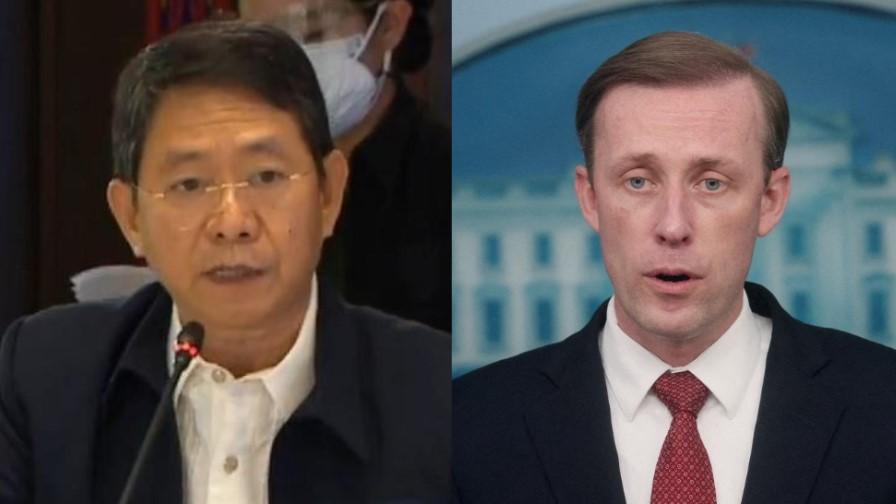PH, US nat'l security heads discuss China's recent 'dangerous' acts

The Philippines and the United States' national security advisers have tackled China's recent dangerous actions Bajo de Masinloc and Escoda Shoal in the West Philippine Sea, the National Security Council (NSC) said on Wednesday.
In a statement, the NSC said Philippine National Security Adviser Eduardo Año and his US counterpart Jake Sullivan had a phone call on Tuesday.
"The two NSAs exchanged information on the current maritime security situation in the region," the NSC said.
According to the NSC, Año and Sullivan raised "grave concerns on the recent illegal, aggressive, and dangerous actions" of the Chinese air force and coast guard against their Philippine counterparts.
Año reiterated the Philippines' rights in the West Philippine Sea (WPS) based on international law, including the UN Convention on the Law of the Sea and the 2016 Arbitral Award.
The NSC said "the two NSAs look forward to the implementation of strategic priorities to accelerate the Philippines' capability development and to continuously modernize the alliance."
Año thanked the US government for its support and ironclad commitment to its alliance with the Philippines.
For his part, Sullivan commended the recently concluded inaugural joint coast guard exercise between the Philippines and Vietnam.
He also lauded the Philippines' efforts to expand the conduct of maritime cooperative activities with like-minded countries in the region and beyond, according to the NSC.
On August 8, the Armed Forces of the Philippines (AFP) said two People's Liberation Army (PLA) Air Force aircraft performed "dangerous and provocative actions" against a Philippine Air Force (PAF) aircraft over Bajo de Masinloc.
The AFP said the Chinese aircraft executed a dangerous maneuver and dropped flares in the path of a NC-212i PAF propeller aircraft conducting a routine maritime patrol over the area.
Chinese PLA's Southern Theater Command said the Philippine aircraft, "despite repeated warnings from China, insisted on illegally intruding into the airspace of Huangyan Island," disrupting training activities.
China's naval and air forces carried out identification, tracking, warning, and expulsion in accordance with the law, it added.
"The on-site operation was professional, abided by norms, legitimate, and legal," the PLA said, urging the Philippines to stop what it called infringement and provocation.
Last Monday, while on their way to deliver essential supplies to Filipino personnel stationed in Patag and Lawak Islands, two Philippine Coast Guard (PCG) vessels collided with CCG ships near Escoda.
BRP Cape Engaño at 3:24 a.m. was navigating 23.01 nautical miles southeast of Escoda Shoal when CCG vessel 3104 performed "aggressive maneuvers," according to the Philippine government.
At 3:40 a.m., BRP Bagacay around 21.3 nautical miles southeast of Escoda Shoal was "rammed twice" on her port and starboard sides by CCG vessel 21551.
However, CCG spokesperson Gan Yu claimed that Philippine vessels BRP Bagacay and BRP Cape Engaño "deliberately" collided with a CCG vessel near Escoda Shoal.
"At 03:24, the Philippine ship No. 4410 (BRP Bagacay) ignored China's repeated solemn warnings and deliberately collided with China's 21551 boat, which was normally safeguarding its rights and enforcing the law in an unprofessional and dangerous manner, resulting in a collision," Gan said.
Tensions continue amid China's massive claim in the South China Sea (SCS), including the portion the Philippines refers to as the West Philippine Sea.
The SCS is a conduit for more than $3 trillion in annual ship commerce. Aside from the Philippines, China has overlapping claims in the area with Vietnam, Malaysia, Indonesia, and Brunei.
In 2016, an international arbitration tribunal in Hague ruled in favor of the Philippines over China's claims in the South China Sea, saying that it had "no legal basis."
China has not recognized the decision. — VDV, GMA Integrated News




